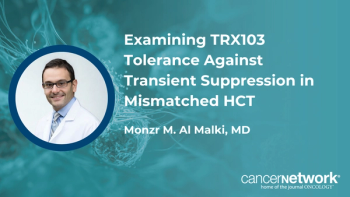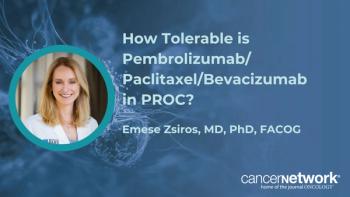
Durvalumab Inferior to Cetuximab in Contraindicated Cisplatin HNSCC
Christina Henson, MD, spoke about the impact negative trial results can have on advancing the head and neck cancer field forward.
Christina Henson, MD, Residency Program Director for Radiation Oncology at Oklahoma University, discussed results from the phase 3 NRG-HN004 trial (NCT03258554) that found durvalumab (Imfinzi) was not comparable to cetuximab (Erbitux) in terms of efficacy for patients with locally advanced or metastatic head and neck squamous cell carcinoma.
At the median follow-up of 6.4 months, a progression-free survival event was observed in 22% of patients in the durvalumab arm and 21% in the cetuximab arm (HR, 1.05; 95% CI, 0.53-2.09). Because of these outcomes, the NRG Oncology Data Monitoring Committee recommended that permanent accrual close for this trial. Additionally, 69 PFS events need to occur during the phase 2 end point analysis.
In a later part of the interview, Henson noted, “It checked 1 [treatment option] off the list of possible things that we keep in mind that might be a good fit for this patient population.”
Transcript:
The standard treatment for head and neck cancers, for most of them, and for most stages, is a combination of radiation and a chemotherapy agent called cisplatin. The issue with that is that cisplatin has a lot of toxicities that we’d like to try to avoid, or that make some patients ineligible to receive it, because they have preexisting conditions that make them not a good candidate. They might already have hearing loss, kidney damage, have neuropathy, or just patients over a certain age, who have other medical comorbidities [and may not be] candidates for cisplatin. There’s this constant search to find something for those patients. The current best thing that we have is a drug called cetuximab, that has been the most studied in this patient population, but it too, has adverse effects. This study was looking to compare an immunotherapy agent called durvalumab to cetuximab, in hopes that it would be equivalent or better.
The trial was intended to go a lot longer than it did, and the goal was to recruit a lot more patients than it ended up recruiting. The reason that it did not is because it closed early, because the planned analysis of the data at that point showed that the experimental arm was not performing as well as the control arm, the cetuximab arm. What we saw after following the patients for 2 years after they received treatment, was that the cure rates were about 13% lower in the experimental arm, which is a pretty big difference.
Reference
Mell LK, Torres-Saavedra PA, Wong SJ, et al. Radiotherapy with cetuximab or durvalumab for locoregionally advanced head and neck cancer in patients with a contraindication to cisplatin (NRG-HN004): an open-label, multicentre, parallel-group, randomised, phase 2/3 trial. Lancet Oncol. 2024;25(12):1576-1588. doi:10.1016/S1470-2045(24)00507-2
Newsletter
Stay up to date on recent advances in the multidisciplinary approach to cancer.










































